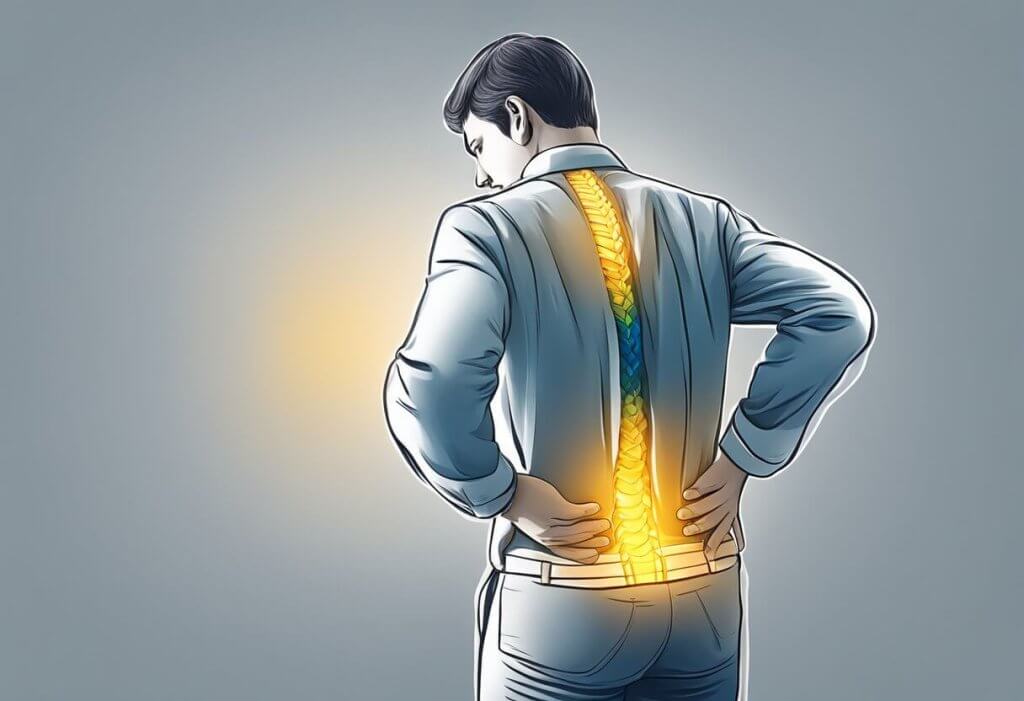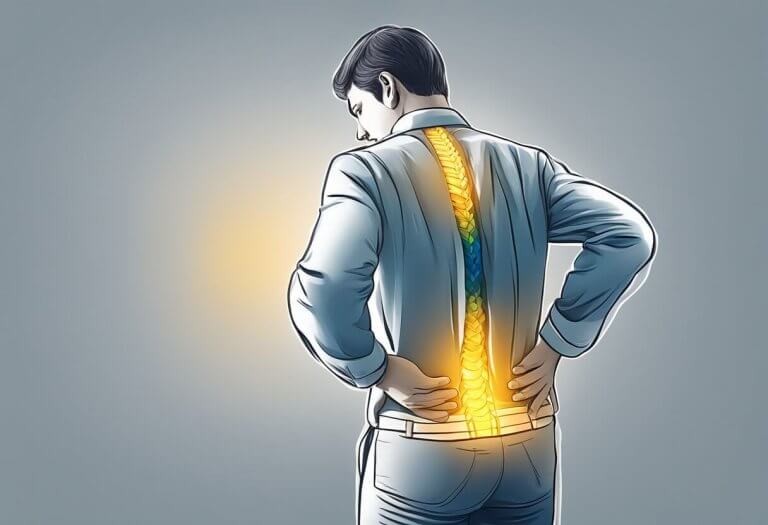Exploring Natural Relief Options
Disclaimer: The anecdotal benefits of CBD mentioned on this website are based on preliminary research and individual user experiences. All information presented here is not meant to substitute for or replace information from health care practitioners. Please click here for our full disclaimer, including side effects, FTC position, etc.
Millions of people struggle with back pain, often finding little relief from traditional treatments. Could CBD offer a glimmer of hope.

If you’re one of the countless individuals battling back pain, you know all too well the frustration of searching for effective relief. From prescription medications with undesirable side effects to invasive surgical procedures, the quest for a solution can feel endless. But what if there was a natural alternative that could help manage your pain without the drawbacks of conventional treatments?
Enter CBD, or cannabidiol, a compound derived from the cannabis plant that has been gaining attention for its potential pain-relieving properties. While research is still ongoing, many people are turning to CBD as a complementary approach to managing their back pain. With its promising potential and growing popularity, it’s no wonder that more and more individuals are eager to explore the benefits of CBD for this common ailment.
In this article, we’ll dive deeper into how full-spectrum CBD may help alleviate back pain, its potential mechanisms of action, and what the current scientific evidence suggests. Whether you’re considering trying CBD for the first time or simply curious about its potential, read on to discover how this fascinating compound could be a valuable addition to your pain management toolkit.
Key Takeaways
- CBD may offer pain relief and reduce inflammation for individuals with chronic back pain.
- Selecting high-quality, tested CBD products is crucial for safety and efficacy.
- Research and understanding of CBD’s role in pain management can help in making informed decisions.
Understanding CBD and Its Role in Pain Management

In recent years, CBD has become a significant player in the pain management arena, specifically for conditions like chronic back pain. The following sections detail CBD, how it works specifically for back pain, and its overall efficacy in relieving pain.
What Is CBD?
Cannabidiol, or CBD, is a non-psychoactive compound in the hemp plant. It’s one of many cannabinoids studied for therapeutic benefits, including pain relief. Unlike THC, another well-known cannabinoid, CBD doesn’t cause a “high,” making it an appealing option for those looking for pain management without psychoactive effects.
How Does CBD Work for Back Pain?
CBD is thought to help mitigate back pain by interacting with the body’s endocannabinoid system (ECS), which regulates various physiological processes, including pain perception and inflammation. CBD oil, creams, and salves can be applied topically, targeting localized pain, while tinctures and CBD patches may offer more systemic relief. Full-spectrum CBD products contain various cannabinoids and terpenes that may enhance pain relief through the “entourage effect,” whereas isolate and broad-spectrum options do not contain THC.
Relevant Fact: CBD may help relieve back pain by reducing inflammation, which is often a major contributing factor in many cases of chronic back pain.
https://www.spine-health.com/treatment/alternative-care/understanding-cbd-cannabidiol-back-pain
Evaluating the Efficacy of CBD in Pain Relief
Research on CBD’s efficacy for pain relief is evolving, with some studies suggesting positive effects on chronic pain, including neuropathic pain and arthritis-related discomfort. While evidence indicates that CBD can reduce inflammation, a major contributor to pain, clinical outcomes can vary. Individuals report varying degrees of pain relief from CBD products, indicating a need for more comprehensive clinical trials to understand better the role of cannabinoids in pain management.
Safety and Quality Considerations

When considering CBD for back pain, safety and quality are paramount. The diversity of products on the market means consumers must be well-informed about potential side effects, the significance of third-party testing, and how to identify high-quality CBD products.
Potential Side Effects and Risks of Using CBD
CBD is generally well-tolerated, but it isn’t free of risks or side effects. Some users might experience dry mouth, fatigue, or changes in appetite and mood. There is also the potential for CBD to interact with other medications, which may lead to increased side effects. Full-spectrum CBD products, which contain up to 0.3 percent THC, could also pose risks, especially if the user is subject to drug testing, as trace amounts of THC may show up on drug screenings.
Understanding the Importance of Third-Party Testing
Third-party testing is crucial for verifying that a CBD product contains the levels of CBD and THC reported on the label while also ensuring it’s free from contaminants like heavy metals and pesticides. Labs that follow ISO 17025 standards are considered reliable. Consumers should always check for a Certificate of Analysis (COA) before purchasing, which should be provided by a reputable lab.
Selecting High-Quality CBD Products
High-quality CBD products start with high-quality ingredients. Consumers should look for products made from organic ingredients and hemp-derived CBD sourced from Cannabis sativa plants. Choosing products from brands with a good reputation that offer full transparency about their offerings is also recommended. This includes providing comprehensive product information and readily available COAs. Products that are legal and have undergone clinical trials are more likely to be safe and effective, contributing positively to the quality of life for those suffering from back pain.
Promising Study: A 2020 study published in the Journal of Pain Research investigated the effects of CBD on chronic pain. The study involved 97 adult participants with chronic pain who were using opioids for pain management. Over half of the participants (53%) reduced or eliminated their opioid use within 8 weeks of adding CBD-rich hemp extract to their regimens. Almost all CBD users (94%) reported quality of life improvements, and many experienced less sleep issues (71%), decreased pain (81%), and improved physical function (68%). The study concluded that CBD could significantly reduce the use of opioids in the treatment of chronic pain and improve quality of life.
Clinically Validated, Hemp-Derived Cannabidiol (CBD) for the Treatment of Chronic Pain
Frequently Asked Questions
In this section, you’ll find straightforward answers to common queries about CBD for back pain, with a focus on its effectiveness, comparison with traditional pain relievers, and usage specifics.
Can CBD gummies actually offer relief for chronic pain sufferers?
CBD gummies may provide chronic pain sufferers with relief due to CBD’s potential to alleviate discomfort. They offer a convenient and discreet way to consume CBD.
What’s the more effective option for pain management, CBD or ibuprofen?
Effectiveness in pain management can vary between individuals; CBD may be preferred for its natural origin and fewer side effects, while ibuprofen is a well-known anti-inflammatory that can reduce pain quickly.
Does CBD target the pain, the inflammation, or both?
CBD is thought to address both pain and inflammation, which can make it a holistic approach to managing symptoms of back pain.
What’s the best form of CBD to use if you’re dealing with constant pain?
For constant pain, high-potency CBD oils or topical creams may be beneficial, offering targeted relief or systemic effects.
How long does it typically take for CBD to start working on back pain?
The onset time for CBD’s effects on back pain can range from 15 minutes to 2 hours, depending on the method of consumption and individual metabolism.
Are there any long-term benefits of using CBD for managing back pain?
There is evidence to suggest that CBD may have long-term benefits in managing back pain by potentially reducing inflammation and improving sleep quality without the habit-forming potential of traditional pain medication.
Success Story: Some studies have found CBD may help provide back pain relief for certain individuals. One study observed that a small group of patients given higher doses of CBD from 50-175 mg/day experienced improvements in their sleep, which is often disrupted by chronic back pain.
https://www.ncbi.nlm.nih.gov/pmc/articles/PMC9731549/
